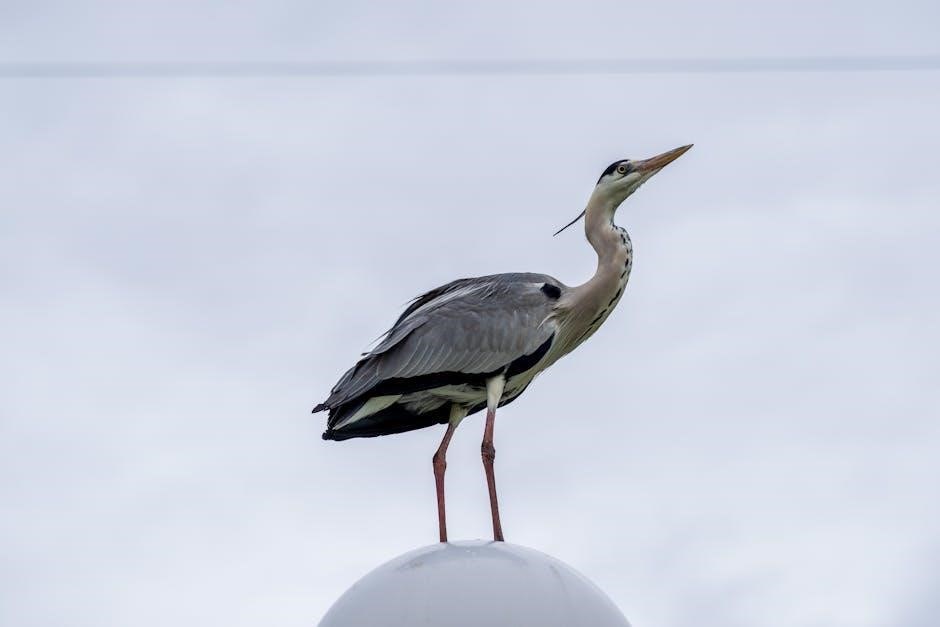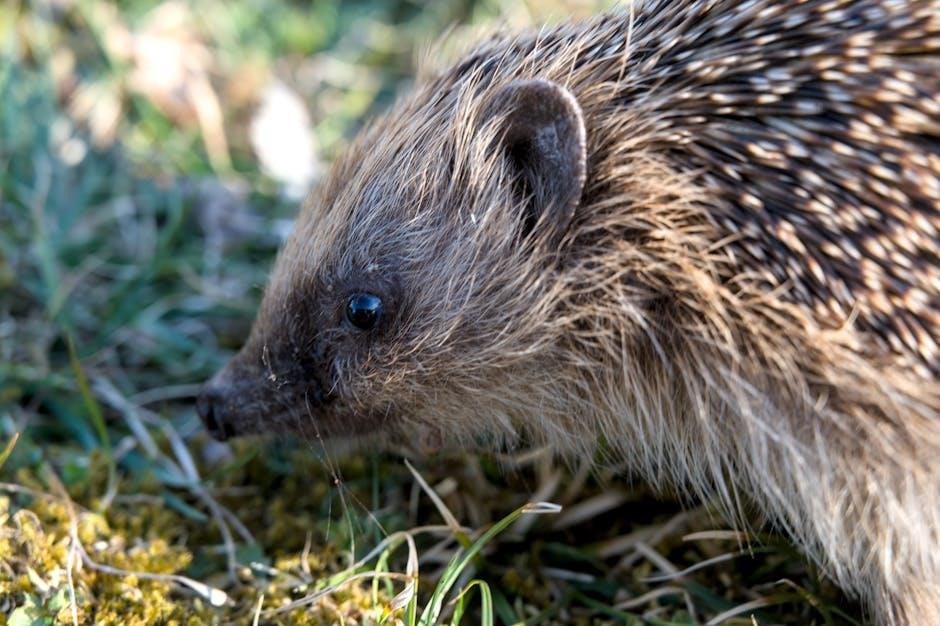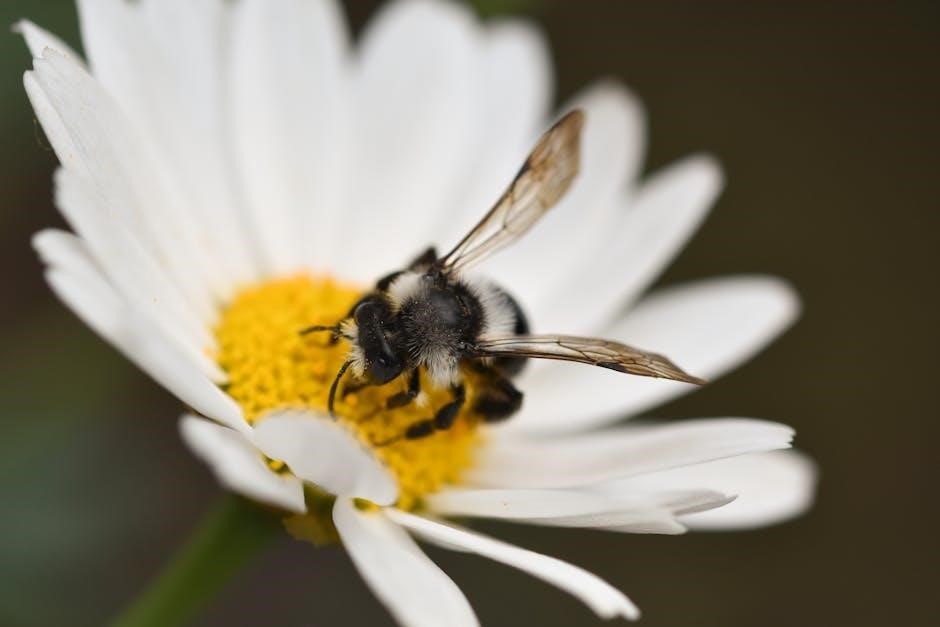
The core curriculum in wildlife biology provides essential training in ecological principles‚ conservation‚ and animal behavior‚ preparing students for careers in wildlife management and research. Foundational courses include biology‚ ecology‚ and statistics‚ while specialized electives like wildlife conservation and biodiversity offer deeper expertise. Practical fieldwork and access to free online resources‚ such as PDF materials and R software for data analysis‚ enhance learning and application. This structured approach ensures a comprehensive understanding of wildlife biology‚ equipping students to address real-world conservation challenges effectively.
Overview of the Importance of Wildlife Biology Education
Wildlife biology education is crucial for understanding ecosystems‚ conservation principles‚ and sustainable management of species; It equips students with the knowledge to address ecological challenges‚ such as biodiversity loss and habitat degradation. By studying wildlife biology‚ individuals gain insights into the complex interactions between humans and nature‚ fostering a deeper appreciation for conservation efforts. This field also emphasizes the role of science in informing policy and practice‚ ensuring that management strategies are evidence-based and effective. Access to free online resources‚ such as PDF materials‚ makes this education more accessible‚ enabling a broader audience to engage with wildlife conservation. Ultimately‚ wildlife biology education prepares professionals to contribute to the preservation of ecosystems and the survival of diverse species in a rapidly changing world.
Structure of a Typical Wildlife Biology Core Curriculum
A typical wildlife biology core curriculum is designed to provide a balanced mix of theoretical knowledge and practical skills. It often begins with foundational courses in biology‚ ecology‚ and statistics‚ which form the basis for advanced studies. These are followed by specialized courses in wildlife ecology‚ conservation biology‚ and animal behavior‚ which delve into the principles of managing and preserving wildlife populations. Electives such as ecological restoration and biodiversity management allow students to tailor their education to specific interests. Practical training through fieldwork and research projects is also a key component‚ enabling hands-on experience in data collection and analysis. Additionally‚ the integration of tools like R software for ecological data analysis enhances the curriculum’s applicability to real-world scenarios. This structured approach ensures students are well-prepared to address the complexities of wildlife conservation and management.

Core Courses in Wildlife Biology
Core courses include foundational biology‚ ecology‚ genetics‚ and wildlife conservation principles‚ providing a comprehensive understanding of ecological systems and species management. Specialized courses focus on animal behavior‚ population dynamics‚ and biodiversity conservation‚ equipping students with practical and theoretical knowledge essential for careers in wildlife biology.
Foundational Biology Courses
Foundational biology courses form the backbone of a wildlife biology curriculum‚ providing essential knowledge in genetics‚ evolution‚ and ecological principles. These courses introduce students to the diversity of life‚ focusing on cellular biology‚ organismal structure‚ and environmental interactions. Key topics include population genetics‚ species adaptation‚ and the fundamental processes that govern ecosystems. By understanding these concepts‚ students build a solid scientific framework necessary for advanced study in wildlife biology. Additionally‚ many institutions offer free online PDF materials and open-access courses‚ allowing students to supplement their learning and explore topics in greater depth. These resources ensure that foundational knowledge is both comprehensive and accessible‚ preparing students for specialized coursework and real-world applications in conservation and management.
Wildlife Ecology and Conservation Principles
Wildlife ecology and conservation principles are central to understanding the interactions between species and their environments. These courses explore the dynamics of ecosystems‚ focusing on population demographics‚ habitat requirements‚ and the impact of human activities on wildlife. Key topics include the role of predators and prey‚ migration patterns‚ and the balance of biodiversity within ecosystems. Conservation principles emphasize sustainable management practices‚ such as habitat restoration and species preservation‚ to mitigate threats like climate change and human encroachment. Students learn to analyze ecological data and develop strategies for protecting endangered species and maintaining healthy ecosystems. Free online resources‚ including PDF guides and case studies‚ provide practical insights into real-world conservation challenges. This knowledge equips future wildlife biologists with the tools to address critical environmental issues effectively.
Animal Behavior and Population Dynamics
Understanding animal behavior and population dynamics is crucial for effective wildlife management and conservation. These courses delve into how animals interact with their environments‚ focusing on behaviors like foraging‚ mating‚ and migration. Students explore how these behaviors influence survival‚ reproduction‚ and adaptation to environmental changes. Population dynamics examine factors such as birth rates‚ mortality‚ and immigration‚ which shape the growth or decline of wildlife populations. This knowledge is essential for developing conservation strategies and predicting how populations will respond to habitat alterations or climate change. Free online resources‚ including PDF guides and case studies‚ provide insights into behavioral patterns and population modeling. By analyzing these dynamics‚ wildlife biologists can design interventions to stabilize or restore populations‚ ensuring the long-term sustainability of species in their ecosystems. This interdisciplinary approach bridges ecology‚ behavior‚ and applied conservation practices.
Specializations and Electives
Specializations and electives allow students to tailor their education‚ with courses in wildlife management‚ conservation strategies‚ and biodiversity. These offerings enhance expertise in targeted areas of wildlife biology. Free PDF resources and online materials support deeper exploration of these topics‚ enabling students to pursue advanced knowledge and practical skills in their chosen specializations‚ preparing them for diverse careers in conservation and ecological restoration. Electives provide flexibility‚ ensuring a well-rounded education aligned with individual career goals. This personalized approach fosters specialization while maintaining a strong foundation in core principles.
Wildlife Management and Conservation Strategies
Wildlife management and conservation strategies are crucial for maintaining healthy ecosystems and biodiversity. These courses focus on sustainable practices‚ population dynamics‚ and habitat restoration. Students learn to develop and implement effective conservation plans‚ balancing human needs with ecological integrity. Modern principles of wildlife management emphasize evidence-based approaches‚ incorporating ecological‚ social‚ and economic factors. Topics include threatened species recovery‚ habitat fragmentation‚ and human-wildlife conflict mitigation. Practical applications are supported by case studies and real-world examples. Free PDF resources and online materials provide accessible learning tools‚ covering advanced methodologies and global conservation challenges. This specialization prepares students to address complex environmental issues‚ ensuring the long-term survival of wildlife populations and ecosystems. By integrating theoretical knowledge with practical skills‚ graduates are equipped to lead in conservation and management roles worldwide.

Ecological Restoration and Biodiversity
Ecological restoration and biodiversity conservation are central to wildlife biology education‚ focusing on rehabilitating degraded ecosystems and preserving species diversity. Courses cover practical approaches to restoring habitats‚ managing invasive species‚ and reintroducing native populations. Students explore the interconnectedness of ecosystems and the importance of biodiversity in maintaining ecological balance. Free PDF resources and case studies provide insights into successful restoration projects and global biodiversity challenges. Emphasis is placed on sustainable practices and community engagement to foster long-term conservation goals. This specialization equips students with the skills to design and implement restoration plans‚ addressing critical environmental issues. By integrating ecological principles with hands-on strategies‚ graduates can contribute to the recovery of threatened ecosystems and the preservation of biodiversity worldwide‚ ensuring a healthier planet for future generations. These courses are essential for developing expertise in ecological restoration and biodiversity management.

Practical Training and Fieldwork
Hands-on experience is crucial in wildlife biology‚ with fieldwork opportunities offering practical skills in data collection‚ species monitoring‚ and ecosystem management‚ enhancing theoretical knowledge with real-world application.
Importance of Hands-On Experience in Wildlife Biology
Hands-on experience is vital in wildlife biology‚ enabling students to apply theoretical knowledge in real-world scenarios. Fieldwork provides practical skills in data collection‚ species monitoring‚ and ecosystem management. It fosters a deeper understanding of ecological processes and prepares students for the challenges of conservation work. Exposure to field conditions helps develop adaptability and problem-solving abilities‚ essential for careers in wildlife management. Additionally‚ practical training enhances collaboration skills through teamwork and mentorship. Access to free resources‚ such as PDF guides and R software‚ further supports hands-on learning. By integrating classroom lessons with fieldwork‚ students gain comprehensive expertise‚ making them proficient professionals in addressing wildlife conservation issues effectively. This experiential approach bridges the gap between academia and practice‚ ensuring well-rounded education and career readiness.
Fieldwork Opportunities in Wildlife Conservation
Fieldwork opportunities in wildlife conservation provide students with invaluable hands-on experience in real-world settings. These experiences allow students to apply theoretical knowledge to practical challenges‚ such as monitoring wildlife populations‚ conducting ecological assessments‚ and implementing conservation strategies. Fieldwork often involves collaborations with wildlife biologists‚ ecologists‚ and conservation organizations‚ offering networking opportunities and exposure to professional practices. Students may participate in projects like habitat restoration‚ species tracking‚ and data collection‚ which enhance their technical and analytical skills. Access to free resources‚ such as PDF guides and online courses‚ further supports field-based learning. Fieldwork not only deepens understanding of ecological principles but also prepares students for the demands of careers in wildlife conservation‚ fostering a connection between classroom learning and practical application. These experiences are crucial for developing competent professionals in the field of wildlife biology.

Online Resources for Wildlife Biology Education
Online resources provide free PDFs‚ open-access courses‚ and R software tools for ecological data analysis‚ supporting wildlife biology education and practical conservation efforts effectively.
Free PDF Materials and Open-Access Courses
Free PDF materials and open-access courses provide students with accessible learning resources for wildlife biology core curriculum topics. These resources include comprehensive guides on wildlife ecology‚ conservation‚ and management‚ often available through university websites or educational platforms. For instance‚ formal curriculum units developed for programs like The Nature of Teaching offer lesson plans aligned with Common Core standards‚ covering essential topics such as biodiversity and ecosystem dynamics. Additionally‚ many universities provide free PDF materials for courses like Wildlife Ecology and Conservation‚ which include detailed lecture notes‚ case studies‚ and practical exercises. These resources are particularly valuable for self-paced learning and offer flexibility for students worldwide. They often complement hands-on fieldwork by providing theoretical foundations and practical applications‚ ensuring a well-rounded education in wildlife biology.
Utilizing R Software for Ecological Data Analysis
R software plays a crucial role in ecological data analysis‚ offering a powerful tool for wildlife biologists to analyze and interpret complex datasets. Its nonproprietary nature makes it accessible for free‚ supporting tasks like population modeling‚ species distribution analysis‚ and biodiversity assessments. Many universities and conservation organizations provide free PDF materials and open-access courses that teach R programming specifically for ecological applications. These resources often include practical exercises and datasets‚ enabling students to apply R in real-world scenarios. By mastering R‚ students gain essential skills in data visualization‚ statistical analysis‚ and spatial ecology‚ which are critical for modern wildlife conservation efforts. This hands-on experience prepares them to tackle challenges in ecological research and management effectively.
Real-World Applications of the Curriculum
Skills learned in wildlife biology curricula apply to conservation‚ research‚ and ecosystem management‚ enabling graduates to address environmental challenges and promote biodiversity through evidence-based practices and innovative solutions.
Case Studies in Wildlife Conservation and Management
Case studies in wildlife conservation and management provide practical insights into real-world challenges‚ such as species recovery‚ habitat restoration‚ and human-wildlife conflict resolution; These studies‚ often included in free PDF materials‚ highlight successful strategies and lessons learned from global conservation efforts. For example‚ the recovery of endangered species like wolves in North America or elephants in Africa demonstrates the application of biological principles and management practices. Students analyze these scenarios to understand the complexities of balancing ecosystem health with human activities. Such case studies also emphasize the importance of data-driven decision-making‚ using tools like R software for ecological analysis. By examining these examples‚ future wildlife biologists gain the skills to address contemporary conservation issues effectively‚ bridging the gap between theory and practice in protecting biodiversity. These resources are invaluable for developing a comprehensive understanding of wildlife management and its applications.
Leave a Reply
You must be logged in to post a comment.